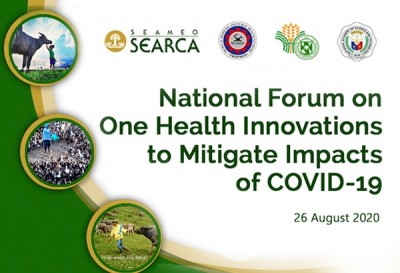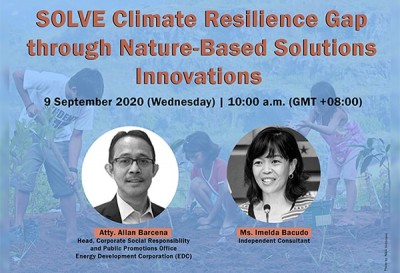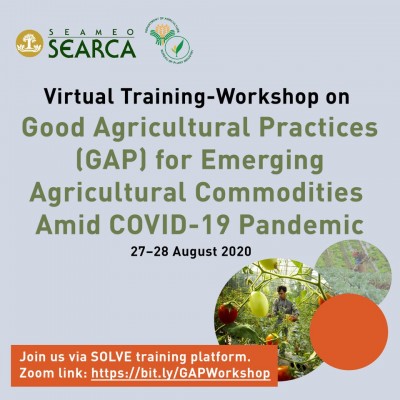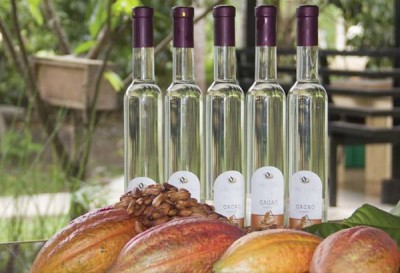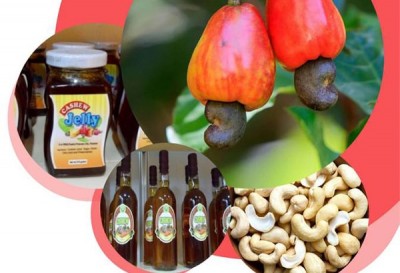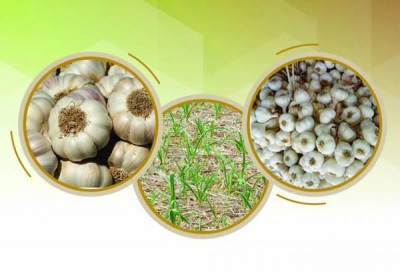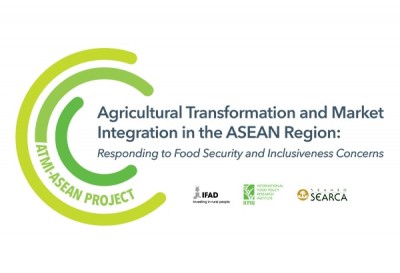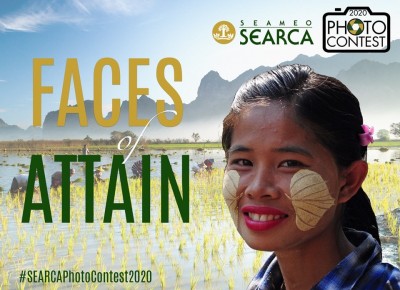SEARCA News
SEARCA leads National Forum on One Health Innovations
15 September 2020
Through SEARCA's Online Learning and Virtual Engagement (SOLVE) platform, the "National Forum on One Health Innovations to Mitigate Impacts of COVID-19" was convened on 26 August 2020 by SEARCA; SEAMEO Regional Centre for Public Health, Hospital Administration, Environmental and Occupational Health (TROPMED Philippines); and the Department of Agriculture (DA) and National Academy of Science and Technology (NAST) of the Philippines. It was virtually attended by representatives from national and local government agencies, and nongovernmental organizations involved in human, animal, and environmental health. There were also participants who are faculty members, researchers and staff of state universities and colleges, and agriculture…
Read more
Dedicated to pursuing enhanced agricultural and rural development (ARD) towards climate resilience that will Accelerate Transformation Through Agricultural Innovation (ATTAIN), the Southeast Asian Regional Center for Graduate Study and Research in Agriculture (SEARCA) conducted the SEARCA Online Learning and Virtual Engagement (SOLVE) webinar on "Climate Resilience Gap through Nature-Based Solutions Innovations" on 9 September 2020 through Zoom and Facebook. Launched on 28 April 2020, the SOLVE webinar intends to provide an avenue for knowledge sharing on concrete innovative actions on the ground along with SEARCA's 11th Five-Year Plan through technology-mediated social platforms that would directly benefit farmers and farming families and…
Read more
The pandemic has greatly affected agricultural production and food systems. It has also emphasized food supply and its safety. Since hazards and contamination can occur in different stages along the production chain, it has become necessary to address food safety measures right at the farm level. A virtual training-workshop on Good Agricultural Practices (GAP) for emerging agricultural commodities amid COVID-19 pandemic was held using the Zoom platform on 27-28 August 2020. It was organized by the Southeast Asian Regional Center for Graduate Study and Research in Agriculture (SEARCA) in collaboration with the Philippine Department of Agriculture-Bureau of Plant Industry (DA-BPI)…
Read more
Soybean has been recognized as a crop with many values. It is seen to have the potential to address malnutrition in children as well as prevent several critical illnesses such as certain types of cancer, diabetes, and cardiovascular diseases. More importantly, it is a good source of various vitamins and minerals, making it a nutritious food for everyone. Realizing the health and nutritional benefits of soybeans, the Golden Beans & Grains Producers Cooperative (GBGPC) implemented a research project funded by the Department of Agriculture-Bureau of Agricultural Research (DA-BAR), titled "Soybean Roast Promotion and Processing Technology Utilization and Promotion in Luzon…
Read more
SEARCA and DA-BAR study showcases cacao wine for potential investors
10 September 2020
The Philippines possesses a competitive advantage among Asian countries in growing cacao due to its geographic location, optimum climatic condition for growth and development, and its proximity to markets. Despite being the first in Asia to plant the crop, the Philippines is a net importer of cacao. Given this, the Department of Agriculture (DA) conducted initiatives to encourage local farmers to boost their production. In the CALABARZON Region, the DA-Quezon Agricultural Research and Experiment Station (QARES) conducted an agribusiness development project funded by the Department of Agriculture-Bureau of Agricultural Research (DA-BAR) which aimed to develop the technology for propagating cacao…
Read more
Cashew is a commodity that has been marketed primarily for its nuts. The province of Palawan in the Philippines is known as the top cashew-producing province where 90% of the total supply is being produced. In fact, with the abundance of the fruit, cashew has been regarded as Palawan's One Town, One Product (OTOP). However, cashew farmers are experiencing low-income return, which was partly attributed to the underutilization of the cashew apple's flesh, which is 90 percent of the entire fruit. This is mainly attributed to the insufficient knowledge of its processing potential. The Western Philippines University realized the need…
Read more
The Ilocos Region is the largest garlic-producing region in the Philippines, contributing more than 65% to the country's total production. It has the best comparative advantage in garlic production because of its agroclimatic suitability. However, the region experienced a decline not just in volume of production but also in the area planted and harvested for garlic. The downward trend in productivity may be attributed to low-yielding varieties and high postharvest losses. In addition, the garlic farmers in the region shifted to other high-value crops as a result of low pricing due to a very stiff competition with imported garlic. In…
Read more
New Country Representatives to the SEARCA Governing Board appointed
8 September 2020
Cambodia and Malaysia have recently appointed the new Country Representatives to the SEARCA Governing Board (GB). The GB is SEARCA's highest policymaking body. It is composed of representatives from each of the 11 member countries of the Southeast Asian Ministers of Education Organization (SEAMEO) who are nominated by their respective Ministers of Education and appointed by the SEAMEO Council President. The new SEARCA GB members are Mr. Ty Channa, Director, Department of Personnel and Human Resource Development, Ministry of Agriculture, Cambodia, and Prof. Dato' Dr. Zulkifli Idrus, Deputy Vice-Chancellor (Research and Innovation), Universiti Putra Malaysia (UPM). Their appointment is for…
Read more
The International Fund for Agricultural Development (IFAD)-funded project Agricultural Transformation and Market Integration in the ASEAN Region: Responding to Food Security and Inclusiveness Concerns, or ATMI-ASEAN, conducted series of virtual meetings to discuss the national road mapping exercise as part of its technical assistance on planning and policy development. This activity has been seriously delayed due to the COVID-19 pandemic. To start, the Southeast Asian Regional Center for Graduate Study and Research in Agriculture (SEARCA) through Dr. Pedcris M. Orencio and Ms. Bernice Anne C. Darvin, Program Head and Program Specialist, respectively, of the Research and Thought Leadership Department (RTLD)…
Read more
SEARCA Photo Contest searches for faces of agricultural innovation
3 September 2020
The 2020 edition of the annual photo contest launched by the Southeast Asian Regional Center for Graduate Study and Research in Agriculture (SEARCA) is in search of striking images of agricultural innovation in Southeast Asia. The SEARCA Photo Contest is open to all nationals of Brunei Darussalam, Cambodia, Indonesia, Lao PDR, Malaysia, Myanmar, the Philippines, Singapore, Thailand, Timor-Leste, and Vietnam. "We are looking for beautiful images that show people taking part in activities that contribute to food and nutrition security, sustainable farming systems and natural resource management, agribusiness for increased productivity and income, enhanced agricultural and rural development (ARD) towards…
Read more
Page 62 of 144
